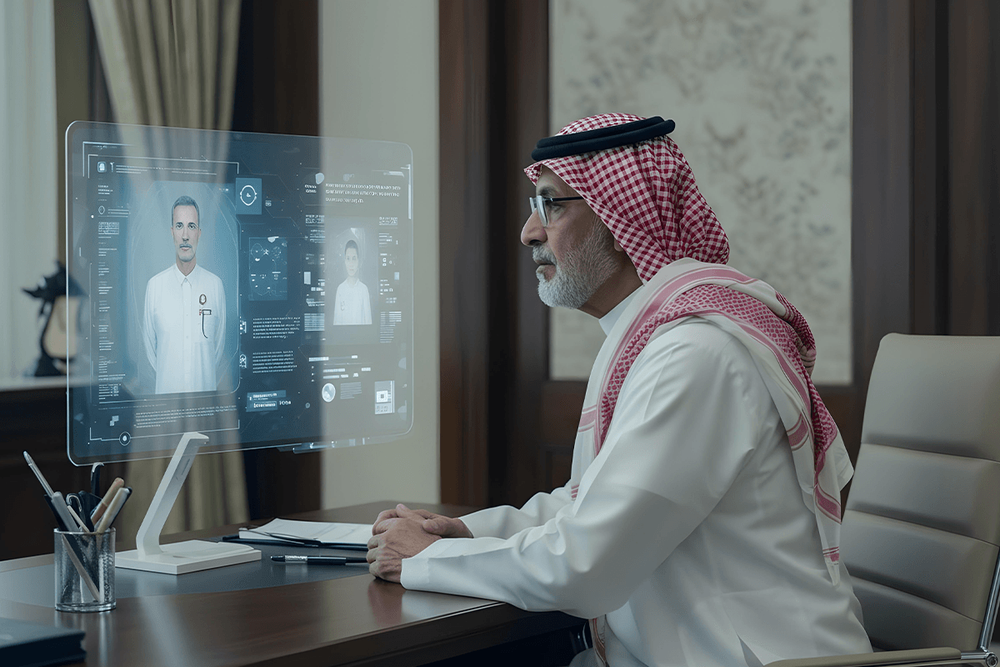Services
Blog
Healthcare Talent Development: Addressing Gaps Through Training
Healthcare talent development strategies to bridge workforce skills gaps through effective training programs. Learn best practices today.

Time to Read
8 Min
Published on
Did you know that in the Future Health Index 2024 survey, 66% of healthcare leaders (including those in Saudi Arabia) reported that staff shortages and skill gaps are causing burnout and delaying patient care? As Saudi Arabia accelerates toward Vision 2030’s ambitious health targets, with new hospitals, cutting-edge medical centers, and telehealth services emerging nationwide, healthcare talent development is more critical than ever.
Despite significant investments, many healthcare providers still face persistent training gaps in healthcare, leaving teams underprepared for advancing technologies, evolving regulations, and the cultural diversity unique to the Kingdom’s patient population. This is why focusing on industry-specific training needs through tailored healthcare training programs is essential.
In this article, we’ll explore strategic steps that decision-makers can take to bridge these gaps and build a future-ready workforce equipped with clinical expertise, regulatory know-how, and cultural sensitivity. Let’s dive in.
Understanding Training Gaps in Healthcare: A Saudi Context
Imagine a leading hospital in Riyadh rolling out a new AI-powered diagnostic system, only to find that many clinicians feel unprepared to use it confidently. This real-world example highlights a common challenge across Saudi Arabia’s rapidly evolving healthcare sector: significant training gaps in healthcare talent development. These gaps arise when healthcare professionals lack the precise skills and knowledge required to keep pace with:

- Rapid Modernization: Cutting-edge technologies and digital health tools are introduced faster than traditional training can keep up.
- Evolving Regulatory Standards: Bodies like the Saudi Commission for Health Specialties (SCFHS) frequently update compliance and accreditation requirements, demanding continuous learning.
- Cultural and Language Diversity: Saudi Arabia’s healthcare workforce is multicultural, making culturally sensitive, bilingual training crucial for effective communication and patient care.
- Emerging Health Challenges: The rise in chronic diseases and the necessity for pandemic preparedness require specialized competencies beyond standard curricula.
- Workforce Shortages and Retention Issues: High turnover in specialized roles forces organizations to rapidly upskill existing staff to maintain quality care.
Recognizing these industry-specific training needs enables healthcare leaders to develop targeted healthcare training programs that transform weaknesses into strengths, ensuring safe, effective, and culturally competent care across the Kingdom.
Why Healthcare Talent Development is a Priority
Saudi Arabia’s bold vision to modernize its healthcare system depends heavily on one critical factor: a skilled, adaptable workforce. With Vision 2030 spotlighting quality healthcare and self-reliance, healthcare talent development has become a strategic imperative for institutions and policymakers alike.
Here’s why investing in talent development pays off:
Enhancing Patient Care Quality
Well-trained professionals deliver safer, more effective treatments, improving outcomes and patient satisfaction—a cornerstone of healthcare excellence.
Ensuring Regulatory Compliance
As regulatory frameworks grow stricter, ongoing training keeps staff aligned with legal and accreditation standards, minimizing risks and protecting institutional reputations.
Addressing Workforce Shortages
Developing local talent fills specialized roles faster, reducing dependency on expatriates and advancing Saudization goals.
Driving Operational Efficiency
Skilled teams optimize workflows, reduce costs, and maximize resources—essential in an expanding healthcare market.
Fostering Innovation and Adaptability
Continuous learning empowers staff to embrace new technologies and best practices, crucial in today’s rapidly evolving medical landscape.
Boosting Employee Engagement and Retention
Offering professional growth opportunities builds loyalty, lowers turnover, and cuts the high costs of recruitment and onboarding.
By prioritizing these industry-specific training needs, Saudi healthcare providers not only safeguard quality and compliance but also build resilient teams prepared for future challenges.
Identifying Industry-Specific Training Needs in Healthcare
Closing training gaps starts with pinpointing the exact skills your healthcare workforce needs. In Saudi Arabia’s unique healthcare environment, this means tailoring programs to reflect both global best practices and local realities. Here’s how organizations can accurately identify their industry-specific training needs:
1. Conduct a Skills Gap Analysis
Assess current staff competencies against role requirements and emerging healthcare demands. For example, a Riyadh hospital recently uncovered a shortage in telehealth coordination skills that required immediate training.
2. Engage Key Stakeholders
Involve clinical leaders, HR teams, and regulatory bodies such as the Saudi Commission for Health Specialties (SCFHS) to align training with strategic goals and compliance.
3. Address Cultural and Language Considerations
Saudi healthcare teams are multicultural. Training must respect language preferences and cultural sensitivities to ensure effective communication and patient-centered care.
4. Focus on Emerging Healthcare Trends
Prioritize skills related to managing chronic diseases, digital health technologies, and pandemic preparedness to stay ahead of evolving patient needs.
5. Include Soft Skills Development
Skills like communication, teamwork, and empathy are crucial for improving patient interactions and outcomes.
6. Keep Training Updated with Regulations
Regularly refresh content to comply with evolving Saudi health laws and accreditation requirements.
7. Choose Flexible Delivery Methods
Combine online, in-person, and on-the-job training to accommodate different learning styles and busy schedules.
Identifying and acting on these targeted needs ensures training investments yield real improvements in healthcare delivery and workforce readiness.
Designing Effective Healthcare Training Programs
Creating healthcare training programs that truly make a difference requires more than just delivering content; it’s about designing learning experiences that engage, educate, and empower healthcare professionals. Here are key principles to consider:
Modularity and Scalability:
Break training into manageable modules so learners can progress step-by-step. This approach makes it easier to scale programs across large teams without overwhelming participants.
Hands-On Learning:
Incorporate practical exercises and simulations that replicate real-world healthcare scenarios. This helps learners apply knowledge confidently and improves decision-making under pressure.
Regulatory Alignment:
Ensure your training content reflects the latest Saudi regulations, patient safety protocols, and accreditation standards, so your staff stays compliant.
Blended Learning Approaches:
Combine classroom sessions, e-learning, and on-the-job coaching. Blended learning offers flexibility, caters to different learning styles, and maximizes retention.
Continuous Updates and Refreshers:
Healthcare evolves quickly—regularly update training materials and provide refresher courses to keep skills sharp and relevant.
Measure and Adapt:
Track performance through assessments and feedback. Use this data to refine your programs and address new or persistent skill gaps.
By embracing these principles, healthcare organizations can deliver training that truly strengthens their workforce, improves patient outcomes, and aligns with Saudi Arabia’s Vision 2030 goals.
Leveraging Technology to Enhance Talent Development in Healthcare
Technology is revolutionizing healthcare talent development, enabling more effective, flexible, and scalable training solutions. By integrating modern tools, healthcare organizations in Saudi Arabia can better address training gaps and prepare their workforce for evolving challenges. Key technological innovations include:
- E-learning Platforms: Provide anytime, anywhere access to training, making it easier for busy healthcare professionals to learn at their own pace.
- Virtual Reality (VR) and Augmented Reality (AR): Offer immersive simulations that allow hands-on practice in a safe, controlled environment.
- Artificial Intelligence (AI): Personalizes learning by analyzing individual performance and recommending tailored training paths.
- **Mobile Learning: **Supports microlearning modules accessible on smartphones, ideal for quick refreshers and on-the-go education.
- Data Analytics: Tracks learner progress and outcomes, enabling continuous improvement of training programs.
Overcoming Challenges in Healthcare Talent Development
Healthcare talent development in Saudi Arabia faces challenges like limited training time, budget constraints, diverse staff backgrounds, and rapidly changing technologies and regulations. To overcome these, organizations should prioritize critical skills, adopt flexible blended learning approaches, partner with expert providers like Coursinity, secure leadership support, and leverage digital platforms for scalable, accessible training. These strategies help build a skilled, adaptable workforce ready to meet the sector’s evolving needs.
HOW COURSINITY SUPPORTS HEALTHCARE TALENT DEVELOPMENT IN SAUDI ARABIA
At Coursinity, we understand the unique demands of Saudi Arabia’s healthcare sector. Our industry-specific training solutions focus on closing skill gaps through:
- Customized, culturally aware content designed for Saudi healthcare professionals.
- Blended training journeys combining expert-led sessions, self-paced learning, and practical exercises.
- Ongoing learner support and performance tracking to ensure skill retention and application.
- Alignment with Saudi regulations and Vision 2030 to future-proof your workforce.
By partnering with Coursinity, healthcare organizations can confidently develop their talent, enhance patient care quality, and build resilient teams prepared for the future.
Ready to close your training gaps and elevate your healthcare workforce?. Book a demo now!
Frequently Asked Questions (FAQs)
Q1: What makes healthcare talent development unique in Saudi Arabia?
Healthcare talent development in Saudi Arabia is distinct due to its focus on Saudization, cultural diversity, and adapting to rapidly changing regulatory requirements. This calls for tailored training programs that address these specific needs.
Q2: How can the long-term impact of healthcare training be measured?
The impact is measured through key indicators such as patient satisfaction scores, reduction in clinical errors, employee retention rates, and compliance with accreditation standards, reflecting sustainable improvements in care quality.
Q3: Are there mandatory certifications for healthcare professionals in Saudi Arabia?
Yes, regulatory bodies like the Saudi Commission for Health Specialties (SCFHS) require healthcare professionals to obtain recognized certifications to ensure competency and professionalism.
Q4: How can small healthcare facilities implement effective training with limited budgets?
Small facilities can leverage flexible e-learning platforms, adopt modular training programs focused on priority skills, and maximize cost-effectiveness without compromising quality.
Q5: What role does mentorship play alongside formal healthcare training?
Mentorship complements formal training by providing personalized guidance, sharing practical experience, and helping staff apply new skills effectively in their daily work.
Share this post
Latest Posts

Blog
Discover practical HR change management strategies to boost performance, engagement, and adaptability. Clear communication, short training, real results.
7 Min Read

Blog
Discover how HR training and development improve productivity, enhance performance, and strengthen workplace culture through tailored and effective programs.
7 Min Read

Blog
Discover practical HR strategies to build a thriving workplace culture through training, communication, and rewards that boost productivity and retention.
8 Min Read